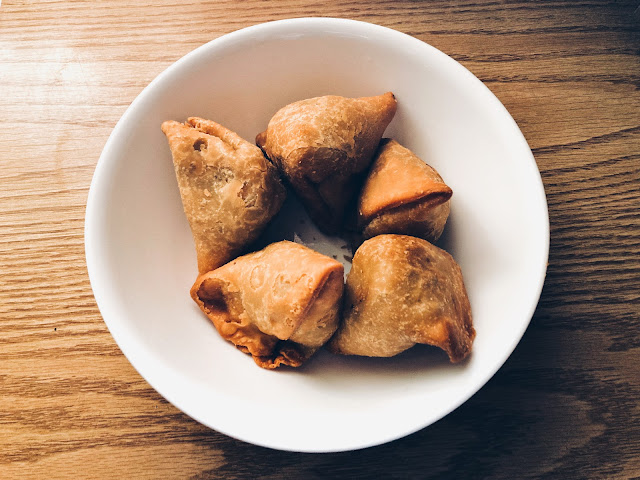Grocery Adventure of September 21, 2023
From New India Bazar!
I usually eat samosas with sugar-free pancake syrup. These packets are convenient and come with a self-serve stand with small brown bags and a tong. The chutney sauce tastes like mild vinegar with a hint of sweetness. Use cash to pay 99 cents for each samosa. If using cards, charges go a bit higher.
From my aunt. I never asked where she got them from until I craved them one time and found out something I never knew about these leaves: their international name other than Saluyot. Saluyot is just a farmer's food to Filipino villagers, so it never crossed my mind that it was more than just a vegetarian diet. They are strong though, most of them who eat them almost daily and are built like Bruce Lee. Some old men brag that their arsenals are built like a rock from eating them. But I thought that was just farm talk. Leaves from the provinces.
I'm sure my aunt also shares these precious leaves with inner family circles. I wonder if she or they know the benefits of these leaves, the history of it, etc. And that they are not just some farmer's food that grew wildly in the small villages of the Philippines. But if they care enough about what Manong Vince has been blogging lately, they can prolong their life by eating these precious leaves more often, which goes back to ancient Jerusalem and Egypt. Read this nutritional values of the Jute Leaves.
It is unclear whether Corchorus Olitorius originated in Africa or in Asia. Some authorities consider that it comes from the Indo-Burmese area or from India, along with several other related species. Others point out that there is a greater genetic variation in Africa and a larger number of wild species in the genus Corchorus. Wherever it originated, it has been under cultivation for a very long time in both continents and probably grows, wild or as a crop, in every country in tropical Africa.
Jute Fiber is hardcore in Bangladesh, India.
During the peak of COVID-19 Jute Fiber Factories workers laid off a mass of workers up to 45,000. And due to this, it was also suicidal.
Ancient period of Jute. Jute has a long and rich history, dating back to ancient times. During the era of the great Mughal emperor Akbar, poor villagers in India wore jute clothes. Since ancient times, Bengali Indians have used white jute to make ropes and twines for a variety of household applications. Chinese papermakers have also used all forms of plants, including jute, hemp, and cotton, to make paper. |
These Jute Fibers make cool-looking grocery bags.
Speaking of grocery bags, I recently used a plastic grocery bag, which I know is bad for the environment. But it's difficult to avoid plastic altogether, because plastic companies have powerful lawyers and people need jobs to support their families, pay their bills, and pay taxes for things like wars and defensive walls. I'm sure plastic companies are aware of the environmental impact of their products, but they continue to produce them because they are profitable.
Jute bags are a more sustainable option, but they are also more expensive. If jute bags were sold for ten cents, it would likely lead to more sweatshops in India. And even if jute bags were affordable, many people would still choose plastic bags because they are free at most grocery stores.
It's a complex issue, and there is no easy answer. But I think it's important to be aware of the ethical implications of our consumption choices. We should all try to reduce our plastic use, but we should also be understanding of the people who work in the plastic industry and the people who rely on plastic bags.
I'm guilty of using plastic bags myself, especially when I don't have my reusable bags with me. But I'm trying to be more mindful of my choices, and I encourage others to do the same.
Without further ado, that's how capitalism works. As long as there are scholarships for bright young minds, some flock to it for a better life, while others are constrained by it. That's when taxes come into play to support its boundaries. I'm sure it is different when you live side by side with different social classes, not necessarily by wealth; any fool can be wealthy whether the system is capitalist or socialist. Balance, perhaps, can be achieved only if we all contribute to artificial robot labor. I have incorporated this notion in a sarcastic manner in my book series, SWARM, which will soon be consolidated into one book as The Pentalogy.
The Quest Gallery (5 images)
Just a quick stop at Target, Safeway, and New Indian Bazar.
| Big Brother is watching incase you don't scan an item. |
I stopped for five samosas for myself and my family while they were cooking jute stew with shrimps. My grandfather loves it, and my mother likes it just a little spicy. Next time, I'll buy eight, because my brother and everyone else likes them too.
Skipping drive-thru joints as much as possible while writing PESTILENT.
















.jpeg)



Comments
Post a Comment